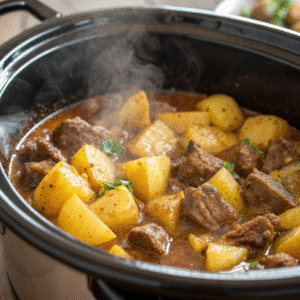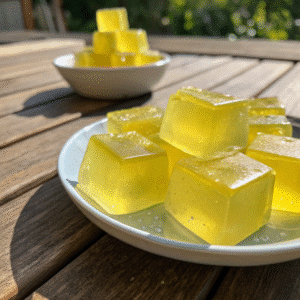The raspberry leaf tea drink has been cherished for centuries as a natural remedy, especially among women preparing for childbirth. While many people confuse it with fruity raspberry-flavored teas, raspberry leaf tea drink is actually made from the leaves of the red raspberry plant, and its reputation comes from its potential to support pregnancy and women’s health. This article will explore what raspberry leaf tea drink is, its nutritional value, how it may benefit pregnant women, when it’s safe to start drinking it, and who should avoid it. Along the way, we’ll also answer the most common questions, such as “When should I start drinking raspberry leaf tea drink?” and “Is it safe during pregnancy?” Whether you’re curious about its traditional use, or simply looking for safe herbal teas to enjoy, this comprehensive guide will give you the clarity you need.
Looking for inspiration? Try the Ice Water Hack recipe, which complements this drink for extra fat-burning potential.
Table of Contents
ToggleWhat Is Raspberry Leaf Tea drink ?
What is raspberry leaf tea drink ?
Raspberry leaf tea drink is an herbal infusion made from the leaves of the red raspberry plant (Rubus idaeus). Unlike teas made from fruits, this drink doesn’t have a sweet, berry flavor. Instead, it carries an earthy, mild, and slightly astringent taste, similar to traditional black tea but without caffeine. Herbalists have used it for generations, especially for women’s reproductive health, as it’s believed to tone the uterus, ease menstrual cramps, and support smoother labor.
This tea gained popularity in midwifery and natural birth communities because of its long history in folk medicine. Today, you’ll find raspberry leaf tea drink in tea bags, loose-leaf form, and even blends mixed with other herbs like nettle or peppermint.
Differences between raspberry leaf tea drink and raspberry fruit tea / raspberry flavored tea
It’s important not to confuse raspberry leaf tea drink with raspberry fruit tea. The latter is typically made from dried raspberry fruits, hibiscus, or added flavorings, resulting in a sweet, fruity cup. While fruit teas are delicious, they don’t carry the same herbal compounds found in raspberry leaves.
Here’s a simple comparison table to clarify:
| Tea Type | Main Ingredient | Flavor | Key Benefits |
|---|---|---|---|
| Raspberry Leaf Tea | Leaves of the raspberry plant | Earthy, mild, slightly bitter | Traditionally used for women’s health, pregnancy support |
| Raspberry Fruit Tea | Raspberry fruit pieces, hibiscus, added flavors | Sweet, fruity, tart | Refreshing beverage, rich in antioxidants, not linked to uterine health |
| Raspberry-Flavored Tea | Regular black/green tea with raspberry flavoring | Sweet, berry-like | Flavorful, caffeinated if black/green tea base |
By understanding these differences, you’ll avoid buying the wrong type of tea when your goal is to explore the potential pregnancy benefits.
Print
Raspberry Leaf Tea Drink: When to Start, Benefits During Pregnancy, and How to Use It Safely
5 Stars 4 Stars 3 Stars 2 Stars 1 Star
No reviews
- Author: Jessica Lupone!
- Total Time: 5 minutes
- Yield: 1 cup 1x
- Diet: Vegan
Description
A calming herbal infusion traditionally used during pregnancy to support uterine health, raspberry leaf tea is rich in minerals and gentle antioxidants.
Ingredients
1 tsp dried raspberry leaves or 1 raspberry leaf tea bag
8 oz boiling water
Optional: peppermint leaves, rosehip, or nettle for added flavor and benefits
Honey or lemon to taste (optional)
Instructions
1. Boil 8 oz of water.
2. Place 1 tsp of dried raspberry leaves or 1 tea bag into a mug.
3. Pour boiling water over the tea.
4. Steep for 5–10 minutes, depending on desired strength.
5. Strain the tea if using loose leaves.
6. Add honey or lemon if desired.
7. Enjoy warm, or let cool and serve over ice for a refreshing iced version.
Notes
Start with 1 cup per day in the second or third trimester of pregnancy, increasing to 2–3 cups daily as tolerated.
Consult with your midwife or doctor before use, especially if you have a high-risk pregnancy, a history of preterm labor, or other medical concerns.
Combining raspberry leaf tea with peppermint or nettle can enhance both flavor and nutritional benefits.
Avoid use in the first trimester unless under direct medical supervision.
- Prep Time: 5 minutes
- Cook Time: 0 minutes
- Category: Beverage
- Method: Steeped
- Cuisine: Herbal
Nutrition
- Serving Size: 1 cup
- Calories: 2
- Sugar: 0g
- Sodium: 2mg
- Fat: 0g
- Saturated Fat: 0g
- Unsaturated Fat: 0g
- Trans Fat: 0g
- Carbohydrates: 0.5g
- Fiber: 0g
- Protein: 0g
- Cholesterol: 0mg
Nutritional Content & Potential Health Benefits
What nutrients are in raspberry leaf tea drink?
The raspberry leaf tea drink is not just a comforting herbal infusion — it also delivers a range of plant-based nutrients. While it’s not a substitute for prenatal vitamins, studies and herbal references show that raspberry leaves contain:
- Vitamins: B vitamins, vitamin C, and trace amounts of vitamin E, all of which support energy metabolism and immunity.
- Minerals: Magnesium, potassium, iron, zinc, and calcium, nutrients important for muscle function, blood health, and bone strength.
- Tannins: Plant compounds that contribute to the tea’s astringent taste and may provide mild anti-inflammatory effects.
- Flavonoids & Polyphenols: Antioxidants that help combat oxidative stress, supporting overall wellness.
Although exact nutrient content varies depending on preparation, these compounds give raspberry leaf tea drink its reputation as a nourishing herbal ally, especially during pregnancy.
Antioxidants and herbal compounds: how they may support maternal health
Many midwives and herbal practitioners recommend raspberry leaf tea drink because of its unique phytochemical profile. Its antioxidants, including ellagic acid and quercetin, may protect maternal tissues from oxidative damage during pregnancy. In addition, raspberry leaves are thought to contain fragarine, a plant compound believed to tone and relax pelvic muscles — potentially aiding in smoother, more coordinated uterine contractions during labor.
Here’s a closer look at some potential maternal health benefits associated with raspberry leaf tea drink:
| Potential Benefit | Explanation | Research Evidence |
|---|---|---|
| Uterine Toning | Fragarine may help strengthen the uterine wall and improve contraction efficiency. | Supported by anecdotal evidence and small studies. |
| Labor Preparation | Traditionally believed to shorten labor and reduce interventions. | Mixed evidence — some studies suggest fewer medical interventions. |
| Menstrual Support | May ease menstrual cramps due to muscle-relaxing effects. | Historically used in herbal medicine for women’s cycles. |
| Antioxidant Boost | Contains polyphenols and flavonoids for cellular protection. | Well-documented in plant chemistry research. |
While more clinical trials are needed, many expectant mothers choose to drink raspberry leaf tea drink under professional guidance for these possible benefits.
Don’t miss our Organic Oil of Oregano remedy, another natural powerhouse for boosting your immune and digestive health.
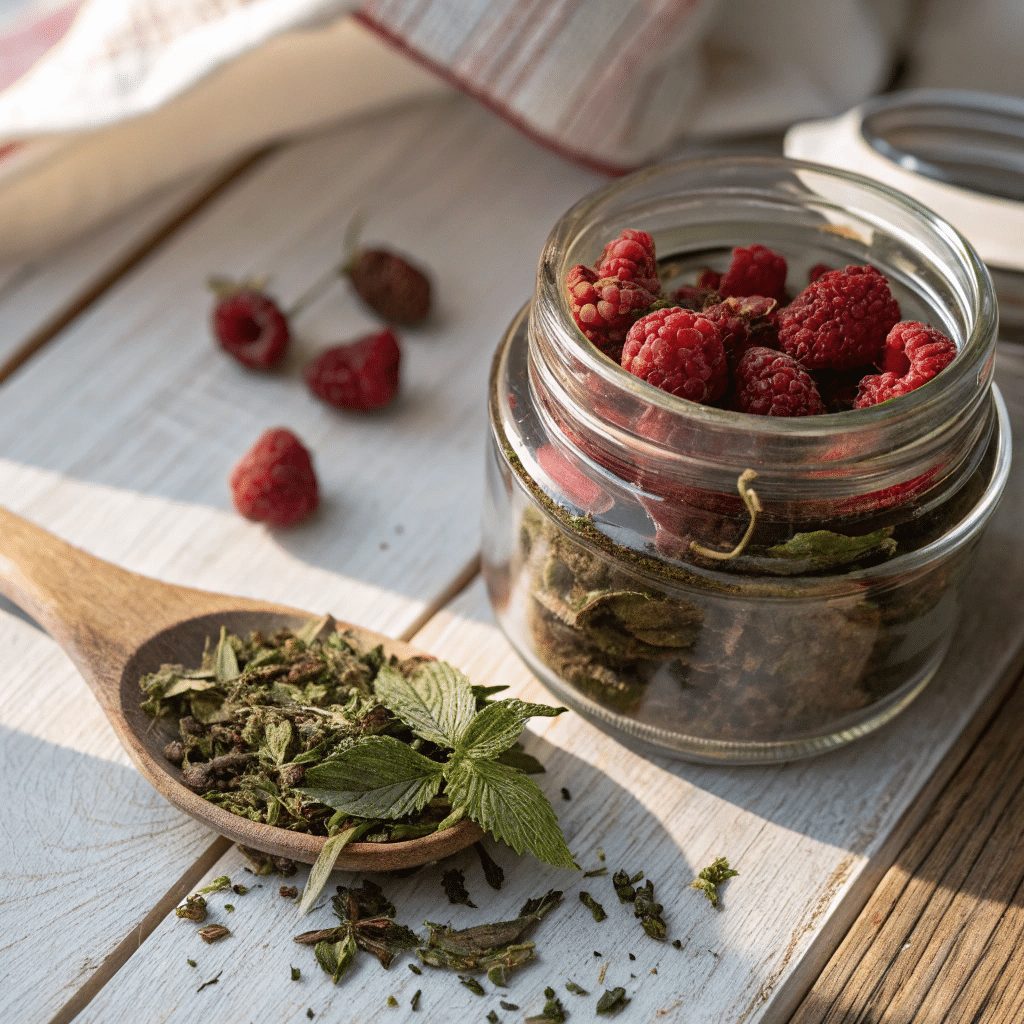
Raspberry Leaf Tea drink During Pregnancy — What the Research Says
Does it shorten labor, reduce interventions, or help in childbirth preparation?
One of the most talked-about reasons women drink the raspberry leaf tea drink during pregnancy is its reputation for preparing the uterus for labor. Many midwives suggest that it may help shorten the second stage of labor — the pushing stage — by strengthening and toning the uterine muscles.
A few small studies have explored this claim. For example, a 1999 study in the Journal of Midwifery & Women’s Health found that women who consumed raspberry leaf tea drink in late pregnancy had a slightly shorter labor and fewer medical interventions like forceps use. Another study suggested that raspberry leaf supplementation may reduce the likelihood of going past due dates.
That said, these studies are limited, and larger-scale research is still lacking. While some women report positive experiences, medical experts emphasize that results vary widely. Drinking raspberry leaf tea drink is not a guaranteed way to shorten labor or prevent complications, but it remains a popular choice for those seeking natural support.
Safety studies & risks — what is known and what remains uncertain
When it comes to safety, raspberry leaf tea drink is generally considered safe for most healthy pregnancies — but timing and moderation matter. Health professionals often recommend starting in the second or third trimester, rather than the first, to avoid any theoretical risk of stimulating the uterus too early.
Potential risks and cautions include:
- Mild digestive upset: Some women experience nausea or loose stools after drinking the tea.
- Uterine contractions: In rare cases, raspberry leaf tea drink may cause stronger Braxton Hicks contractions.
- Possible allergic reactions: Though uncommon, some individuals sensitive to raspberries or related plants may react.
It’s important to note that research is not yet conclusive. Because every pregnancy is different, midwives and doctors advise consulting with a healthcare provider before making raspberry leaf tea drink a daily habit. Women with high-risk pregnancies, a history of preterm labor, or complications such as placenta previa should be especially cautious.
For those who can safely drink it, raspberry leaf tea drink may serve as a gentle herbal companion during pregnancy. Still, it should be viewed as a supplement to, not a replacement for, professional prenatal care.
Discover great ideas like the Keto & Low Carb recipes, which complement a natural Ozempic recipe for maximum fat-burning synergy.
When to Start Drinking Raspberry Leaf Tea drink
General recommendations — second vs third trimester
One of the most common questions about the raspberry leaf tea drink drink is when to start drinking it. Most midwives and herbalists recommend waiting until the second trimester (around 12–14 weeks) or, more commonly, the third trimester (from 28 weeks onward). The reason is that raspberry leaf tea drink is traditionally believed to tone the uterus, which may be beneficial as labor approaches but less appropriate during early pregnancy.
Here’s a general breakdown often suggested by natural health practitioners:
| Pregnancy Stage | Raspberry Leaf Tea Recommendation |
|---|---|
| First Trimester (0–12 weeks) | Usually avoided due to concerns about stimulating the uterus too early |
| Second Trimester (13–27 weeks) | Some midwives may recommend starting with small amounts if pregnancy is healthy |
| Third Trimester (28–40 weeks) | Most common time to begin, gradually increasing intake under professional guidance |
By starting in the later months, many women feel reassured that they’re preparing their bodies for birth without adding unnecessary risks.
What about starting earlier — risks or cautions for first trimester
Drinking raspberry leaf tea drink in the first trimester is often discouraged because of its potential uterine-stimulating properties. While there isn’t strong evidence proving it causes miscarriage or complications, healthcare providers prefer a cautious approach.
Here are some important cautions for early pregnancy:
- Possible uterine contractions: The tea may, in theory, stimulate uterine activity before the body is ready.
- Individual sensitivity: Some women may feel cramping or discomfort if consumed too early.
- Safer alternatives: If you want a gentle herbal tea in the first trimester, options like ginger tea (for nausea) or peppermint tea (for digestion) are often considered safer.
Ultimately, the timing of when to start raspberry leaf tea drink depends on your personal health, pregnancy history, and your doctor’s or midwife’s advice. For most expectant mothers, beginning in the third trimester is seen as the safest and most effective option.
Discover great ideas like the Natural Ozempic Recipe which can be combined with baking soda detox strategies to support weight and energy goals.
How to Drink Raspberry Leaf Tea drink — Dosage, Preparation, and Guidelines
How much is considered safe / typical daily cups
When drinking the raspberry leaf tea drink drink during pregnancy, moderation is key. Herbal practitioners and midwives often suggest starting with one cup per day and gradually increasing to 2–3 cups daily as the pregnancy progresses into the third trimester. This gradual approach helps the body adjust and allows you to monitor for any side effects, such as cramping or digestive upset.
Here’s a commonly recommended guideline for dosage:
| Trimester | Suggested Daily Intake | Notes |
|---|---|---|
| Second Trimester | 1 cup daily | Start small to test tolerance |
| Early Third Trimester | 1–2 cups daily | Slowly increase if no side effects |
| Late Third Trimester | 2–3 cups daily | Many women maintain this until labor |
It’s worth emphasizing that there’s no universal “right amount” that works for everyone. Each woman’s body responds differently, so consulting with a midwife or healthcare provider ensures that you’re drinking an amount suited to your individual needs.
How to prepare a good cup: loose leaf vs tea bags, steeping time, combinations
Brewing raspberry leaf tea drink is simple, but preparation style can affect both flavor and potency.
Loose leaf vs tea bags:
- Loose leaf tea is often considered fresher and stronger since the leaves are less processed.
- Tea bags are convenient, pre-measured, and easier to use on the go.
Basic brewing instructions:
- Place 1 teaspoon of dried raspberry leaves (or 1 tea bag) into a cup.
- Pour in 8 ounces of boiling water.
- Steep for 5–10 minutes depending on your taste preference.
- Strain (if using loose leaf) and enjoy warm, or let cool for an iced version.
Flavor combinations:
Many women find raspberry leaf tea’s earthy flavor a little strong on its own. To make it more enjoyable, try blending it with:
- Peppermint — for a refreshing taste and to ease digestion.
- Rosehip — for extra vitamin C and a slightly fruity note.
- Nettle — often paired with raspberry leaf in pregnancy teas for added minerals.
By experimenting with blends, you can turn raspberry leaf tea into a nourishing ritual that’s not only beneficial but also pleasant to sip daily.
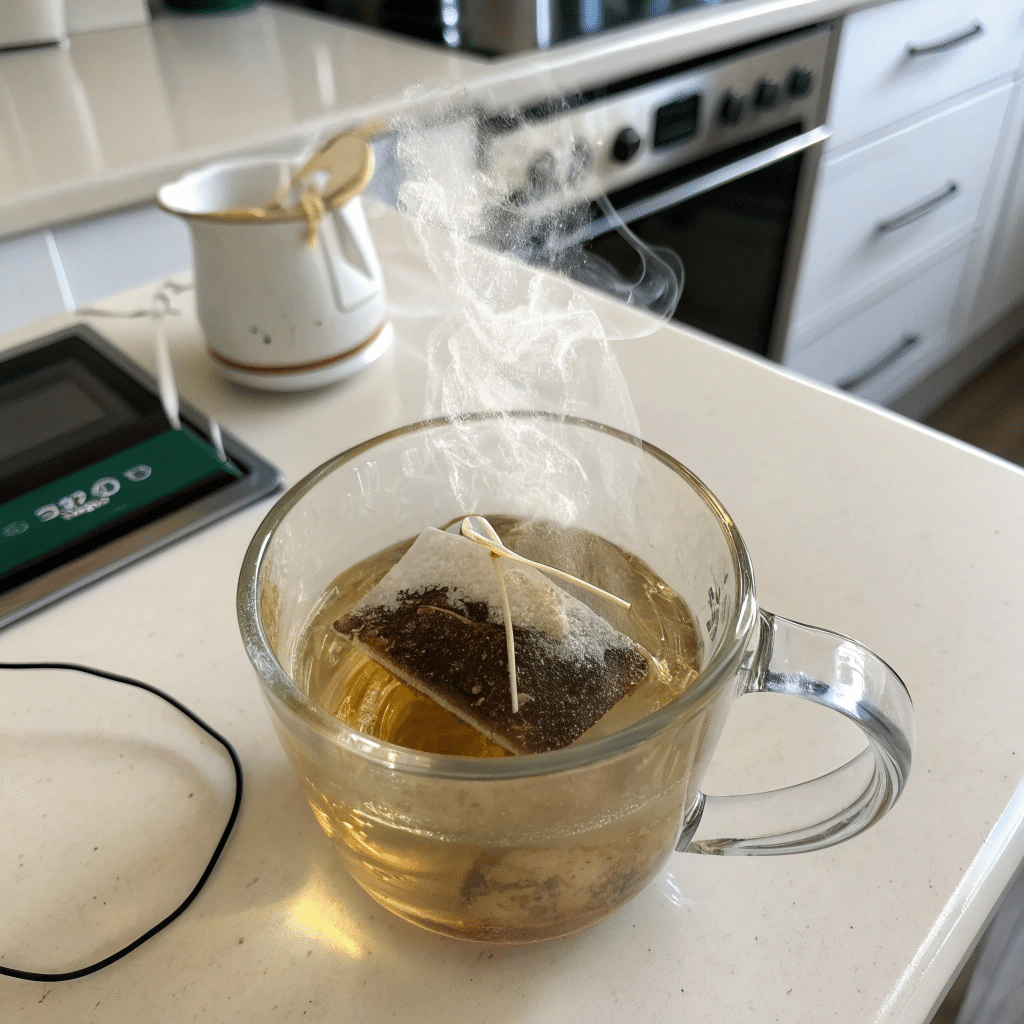
Who Should Avoid or Use Raspberry Leaf Tea drink with Caution
High risk pregnancies, history of preterm labor, certain medical concerns
While the raspberry leaf tea drink is safe for many women, it isn’t the best choice for everyone. Healthcare professionals often recommend avoiding or limiting it in high-risk pregnancies or if you have certain medical conditions. Some situations where caution is advised include:
- History of preterm labor: Since raspberry leaf tea drink may stimulate the uterus, women with early contractions should avoid it.
- Multiple pregnancies (twins, triplets, etc.): Carrying multiples already increases uterine activity, so adding raspberry leaf tea drink may not be safe.
- Placenta previa or previous cesarean section: These conditions require careful medical monitoring, and herbal teas that affect the uterus may complicate matters.
- High blood pressure or preeclampsia: Although research is limited, women with blood pressure concerns should consult their doctor before drinking herbal teas.
- Other medical concerns: Allergies to raspberry plants, hormone-sensitive conditions, or gastrointestinal issues may also require extra caution.
In these cases, it’s best to consult with your healthcare provider before adding raspberry leaf tea drink to your daily routine.
What symptoms to watch out for (e.g. contractions, spotting)
Even if you have a healthy pregnancy, it’s important to pay attention to how your body reacts after drinking raspberry leaf tea. While most women tolerate it well, some notice stronger reactions. Signs that you may need to cut back or stop drinking it include:
- Intense or frequent Braxton Hicks contractions
- Cramping that feels unusual or painful
- Spotting or bleeding
- Digestive issues such as diarrhea or nausea
- Allergic reactions (itching, rash, swelling)
If any of these occur, stop drinking the tea and talk with your midwife or doctor right away.
Remember, raspberry leaf tea should be a supportive herbal drink, not something that causes discomfort or worry. Listening to your body and communicating with your healthcare team ensures that you’re using it safely.
Conclusion About Raspberry Leaf Tea Drink
The raspberry leaf tea drink has earned its place as one of the most talked-about herbal teas for women, especially during pregnancy. Known for its mineral content, antioxidant compounds, and possible benefits for uterine strength, this tea continues to be recommended by many midwives and natural health practitioners.
The key takeaway is timing: most experts agree that raspberry leaf tea drink is best introduced in the third trimester, with a gradual increase from one to three cups per day as tolerated. While some studies suggest it may shorten labor or reduce interventions, research is still limited, and results vary widely.
It’s also crucial to remember that raspberry leaf tea is not suitable for everyone. Women with high-risk pregnancies, a history of preterm labor, or other complications should seek medical advice before drinking it. Even in healthy pregnancies, monitoring your body’s reaction and consulting with your provider ensures safety.
For those who can enjoy it, raspberry leaf tea can be a comforting and nourishing ritual during the final stages of pregnancy and even postpartum recovery. Like all herbal remedies, it works best when paired with professional guidance and a balanced approach to maternal health.
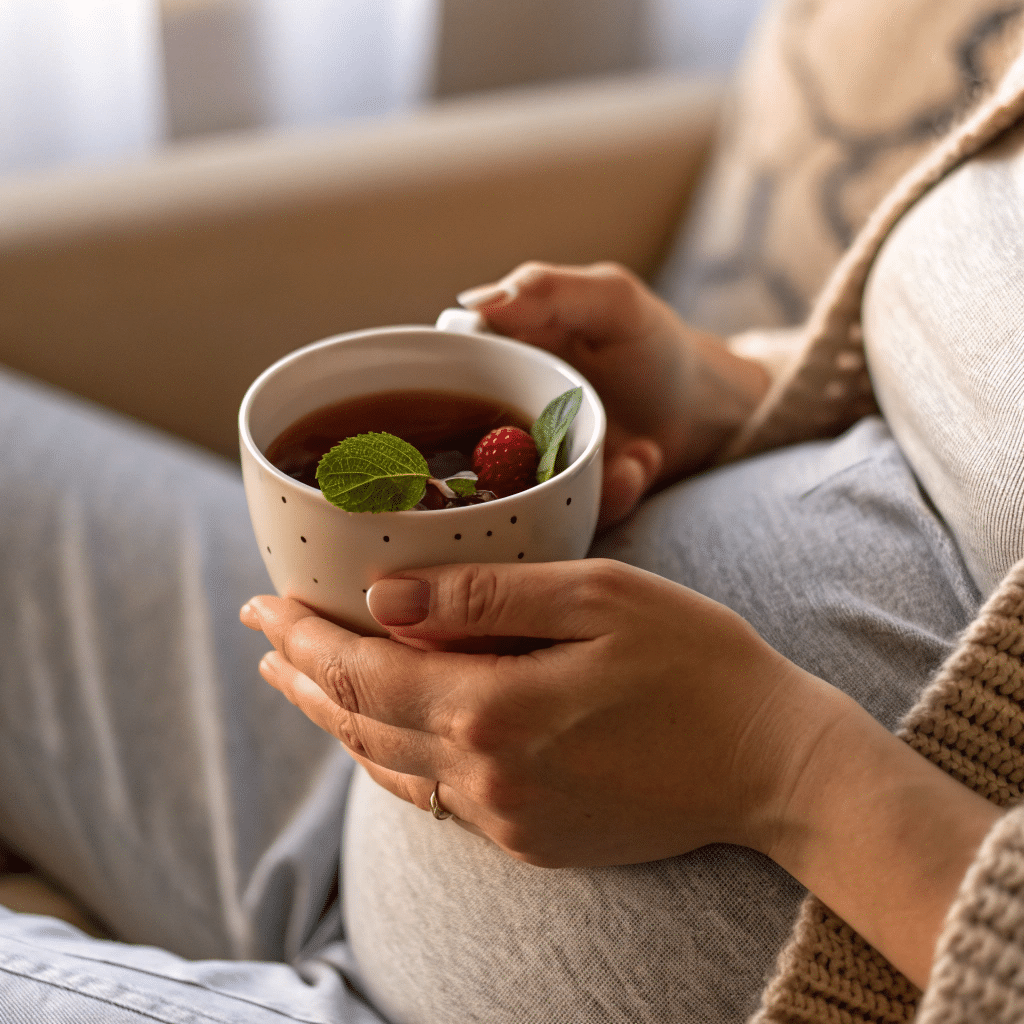
For more recipes Follow me in our Social media
Facebook: https://www.facebook.com/profile.php?id=61573913076847
Pinterest: https://www.pinterest.com/momandgrandmacooks/
Medium: https://medium.com/@momandgrandmacooks
FAQs About Raspberry Leaf Tea Drink
When to start drinking raspberry leaf tea drink
The most common advice from midwives and herbalists is to start drinking raspberry leaf tea in the second or third trimester. Beginning around 28 weeks is the most popular recommendation. Starting earlier is generally avoided, as the tea may stimulate uterine activity that isn’t ideal in early pregnancy.
Raspberry leaf tea during pregnancy
Yes, raspberry leaf tea can be consumed during pregnancy, but only with caution and medical guidance. It is often used to support the body in preparing for labor by toning the uterine muscles and providing helpful minerals like iron and magnesium. Most women limit intake to 1–3 cups per day in late pregnancy, always checking with their doctor or midwife first.
When should I start drinking raspberry leaf tea
You should usually start drinking raspberry leaf tea in the third trimester (around 28–32 weeks), unless otherwise guided by a healthcare professional. Some women start with a single cup daily and gradually increase to 2–3 cups, monitoring for any side effects.
Can raspberry leaf tea induce labor?
Raspberry leaf tea is not a labor inducer in the way castor oil or medical interventions are. Instead, it is thought to support more efficient contractions once labor begins naturally. It may help shorten the pushing stage but won’t directly trigger labor.
Is raspberry leaf tea safe after giving birth?
Yes, many women continue drinking raspberry leaf tea postpartum. Its mineral content may help with recovery, and its uterine-toning properties could support the return of the uterus to its pre-pregnancy size. However, if you’re breastfeeding, consult your doctor, as every body reacts differently.
How does raspberry leaf tea taste?
Unlike sweet raspberry fruit teas, raspberry leaf tea has an earthy, grassy, and slightly astringent flavor. Many people enjoy it more when blended with peppermint, rosehip, or other herbs.







